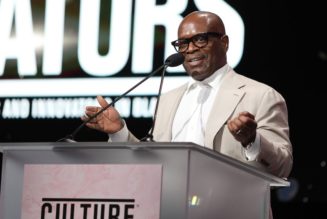Arts
‘Graveyard Queens’ raises expectations of women in theatre
Friday July 21 2023
Full cast and Directors of The Graveyard Queens (From left:) Nice Githinji co-director, Agnes Kola, Carol Odongo, John Kararahe, Mumbi Kaigwa, and co-director Nyokabi Macharia in The Graveyard Queens at Braeside School, on July 15, 2023. PHOTO | MARGARETTA WA GACHERU | NMG
The title alone, The Graveyard Queens, kept us speculating about what we were going to see when the show opened at Braeside School auditorium last Friday night, July 13. Would it be a comedy or a spoof on death and monarchy?
Or might it merely be a tale of widows who have some peculiar penchant for hanging out at gravesites?
Or perhaps it’s one specific gravesite where their dead spouses reside, and which they claim control over, thus entitling them to the rank of grave nobility.
The latter came closer to the truth of what we saw last weekend when the curtain went up on a well-appointed set highlighting the home of Doris (Carol Odongo), one of the three widows who meet monthly to visit their dead husbands’ graves and commune with their men’s spirit out of a sense of duty, dogma, dignity, or self-indulgence.
Graveyard Queens might best be described as a dark comedy premised on the problem of death and grief and how to live after the death of a loved one.
It’s also a play etched with humour and irony, pathos and pain, laughter and tears.
It’s a complex mix, well directed by two of our finest and most versatile female actors, Nice Githinji and Nyokabi Macharia.
It was they who selected three more of the best female actors to play the ‘queens’, Doris, Ida, and Tabitha.
The three have been dear friends for years, although it would seem they have little in common other than each having her own dead spouse. Doris is cool and calm, dutiful and dedicated to peace.
Ida (Mumbi Kaigwa) is austere, judgmental, and adamant that a wife’s duty to her man supersedes all other personal interests, be he alive or dead.
And Tabitha (Muthoni Gathecha) is loud, audacious, aggressive, and intent on ‘moving on’ from dour widowhood, irrespective of social codes, culture, or tradition.
Ida disapproves of Tabby’s disregard for duty and cultural decorum. Nonetheless, the trio has practised the ritual of monthly meetings at the men’s graves for years, and that has cemented their bonds.
Ida especially has taken those trips to her hubby’s grave as a chance to unburden herself in conversation with the dead man.
With the stage set so thoughtfully, there is room for the women to cross over into their spouses’ cemetery where their gravesites are clustered together.
As the years have passed, it would seem that only Ida sits with the spirit of her spouse, Abe, and chats. Doris is increasingly attentive to Tabby’s radical suggestion to disband their Graveyard Club and ‘move on’.
But she’s still in a quandary about when, if ever, the duty implicit in her matrimonial vows is finished.
Coincidentally, Tabby entraps Sam (John Kararahe) to come to Carol’s where their club meets, and there, Sam and Carol ‘hook up’.
The other two suddenly decide they don’t want to lose what they’ve got, a trio of widow troopers committed to retaining the status quo. The two swoop in and warn Sam not to rock the boat, to which he agrees.
All of them have been looking forward to the climactic moment of their friend Salma’s latest wedding. It’s anticipated to be a festive event, and Sam had offered to take Carol to it alone.
But due to the two widows’ directive, he finds someone else to take to the wedding, Christabel (Agnes Kola), crushing Doris’ high hopes in the process.
In the end, the two finally match up. But before that happens, the wedding ensues. The event is a spectacular success, and all three women come back to stay at Doris’.
All three are drunk and nostalgic to the point where even Ida is dancing and falling all over herself in laughter and booze.
In the morning, Ida doesn’t emerge from her room. That’s when her body is discovered. Her death is a terrible surprise, and I must ask: why did the scriptwriter decide on that move?
Okay, the Graveyard Club was on the verge of coming to an end. And with the club having become the centre of her life, perhaps that explains why she may have felt she had no other reason for living, so death was the only option in her mind.
In any case, I was disappointed with the ending since Ida’s demise felt like an unfortunate ending to the play. Whatever message was meant to come out wasn’t clear.
Nonetheless, the better ending was the second episode of Doris and Sam’s hook-up. That made more sense to me. But then I guess I’m a romantic at heart.








